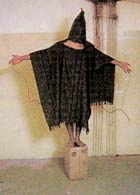It's getting close to fire season here in S.D., and I've just read a hilarious short story by
Nicole Panter,
"Mr. Right On," that, with a very thin veil, blows the lid off a
certain South California lefty social critic. Poetry seems like the only way to put it all together today.
Reading Mike Davis, Ecology of Fear
Got a postmodern fantasy where
American dreams grow up the hills
while puma sifts through
blue oak ashes.
We’re not safe anymore without
infrared detectors; predators
in the parks with screw-
top bottles and fresh
spikes from some needle exchange program
leave their trash in our very last stand
of California
wild lilac. Soft
white, like clouds on bluffs,
they sway to the west
on salt-sweet winds. Smoke
from centuries-old
indigenous fires,
secured in warty
bark and hairy stems,
in soft petals wet
with fog, comes to life
as morning sun warms
ancient chaparral.
Memories of black
ash and green rebirth. But we got it
going on: our Council voted for new
assessment taxes;
more police have been
assigned to the area; and fire
suppression measures have been taken.
The bright olive tides
of hills flowing down
to meet the sea look
like safe havens, yet
beneath green comfort
small beings scurry
in fear. A small pile
of tan feathers, blood
on their quill-tips, point
to a tiny death
under a perfect
sun. The light touches
dappled soils through
the chest-high brush; all
feel the warmth of day,
feel the fog-kissed breath
of night, know that days
mark the passages
to the impending
transference to the ancestor’s world.
For now, you cannot see that motion
sensors hide beneath
waves of golden earth.


















